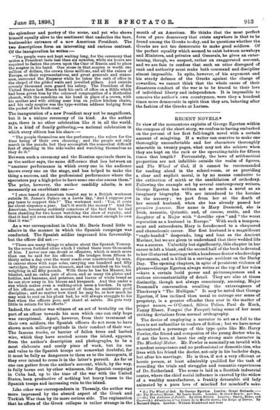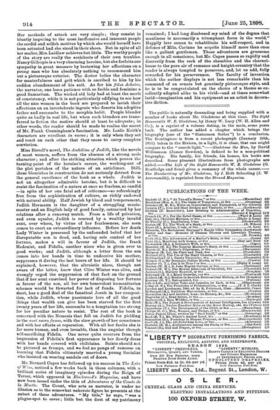RECENT NOVELS.•
IN view of the momentous exploits of George Egerton within the compass of the short story, we confess to having embarked on the perusal of her first full-length novel with a certain amount of misgiving. If a writer can contrive to make one thoroughly uncomfortable and her characters thoroughly miserable in twenty pages, what may not she achieve when they are kept on the rack or the operating-table for fifteen times that length Fortunately, the laws of arithmetical proportion are not infallible outside the realm of figures, and The Wheel of God, if it cannot be recommended for reading aloud in the school-room, or as providing a clear and explicit moral, is by no means conducive to the extinction of mirth or the annihilation of orthodoxy. Following the example set by several contemporary writers, George Egerton has written not so much a novel as an imaginary biography. We are introduced to the heroine in the nursery ; we part from her at the death of her second husband, when she has already passed her premiere jeunesse. Her name is Mary Desmond, she is Irish, neurotic, Quixotic, and, of course, erotic, and the daughter of a Major with " dovelike eyes " and " the worst reputation as a husband in Europe." With such a tempera- ment and antecedents, Mary is foredoomed to a chequered and chameleonic career. Her first husband is a magnificent " eagle-headed " desperado, long and lean as the Ancient Mariner, but we are given to understand that their wedded life was a success. Unluckily bat significantly, this chapter in her career is left a blank, and the second half of the book is devoted to her ill-starred marriage with a handsome doctor who develops dipsomania, and is killed in a carriage accident on the Derby Day. The opening chapters, in spite of persistent violence of phrase—George Egerton always writes at the top of her voice —have a certain lurid power and picturesqueness and a curious circumstantiality of detail. They are also at times distinctly, though not always consciously, amusing, Major Desmond's conversation recalling the extravagance of Thackeray's " The Mulligan." It may be noted that George Egerton, if less inclined than usual to outrage our sense of propriety, is a greater offender than ever in the matter of proper names, — O'Connel, Silvio Pelico, Paul de Koch, Fanny Elsser, FongutS (for Fouque) being some of her most striking deviations from normal orthography.
The device of employing a narrator to act as a foil to the hero is not unfamiliar to readers of fiction ; but we have never encountered a personage of this type quite like Mr. Harry Fowler, the friend and companion of the young doctor who is, if not the hero, at least the only strong male character in The Mischief-Maker. Mr. Fowler is nominally an invalid with a modest competence and no professional or domestic ties, who lives with his friend the doctor, not only in his bachelor days, but after his marriage. He is thin, if not a very efficient or heroic person, at least admirably qualified for the task of recording the trials and struggles and romantic experiences of Dr. Sutherland. The scene is laid in a Scottish industrial centre, where the chief social influence is exerted by the widow of a wealthy manufacturer, a frankly detestable old lady animated by a pure love of mischief for mischief's sake.
• (I.) The Wheel of God. By George Egerton. London Grant Rioliardz.— (2.) The Mischief-Maker. By Leslie Keith. London : R chard Bentle- and Son_ —(3.) The Ambition of Judith. By Olive Birrell. London Smith, Elder, and 0o.—(4.) Adventures of fail Comte de la Illuetto during the Reign of Terror. By Bernard Gapes. London: William Blackwood and Sons Her methods of attack are very simple ; they consist in bluntly imputing to the most inoffensive and innocent people the sordid and selfish motives by which she would herself have been actuated had she stood in their shoes. But in spite of all her malice, Mrs. Laidlaw achieves but little. The worthy people of the story are really the architects of their own troubles. Nancy Gillespie is a very charming heroine, but she forfeits our sympathy in great measure by bestowing her affections on a young man who has absolutely nothing to recommend him but a picturesque exterior. The doctor belies the character for masterfulness and grit which is ascribed to him by his sudden abandonment of his suit. As for his fidus Achates, the narrator, one loses patience with so feeble and feminine a good Samaritan. The wicked old lady had at least the merit of consistency, while it is not particularly edifying to see how all the nice women in the book are prepared to lavish their affections on an invertebrate ingrate who deserts his adoptive father and succumbs to the morphia habit.. People blunder quite as badly in real life, but when such blunders are trans- ferred to fiction the motive should at least be adequate; in other words, the reader should be made to realise the secret of Mr. Frank Cunningham's fascination. Mr. Leslie Keith's !.haracters are excellent in vacua ; it is only when they act and react on each other that they cease to carry complete conviction.
Miss Birrell's novel, The Ambition of Judith, like the novels of most women, suffers from the absence of a strong male character ; and after the striking situation which proves the turning-point of the heroine's career, the working-out of the plot partakes of the nature of an anticlimax. Still, these blemishes in construction do not seriously detract from the general excellence of the book as a whole. Judith is not an altogether admirable heroine, but it is difficult to resist the fascination of a nature at once so fearless, so candid —in spite of her one fatal act of reticence—so refreshingly free from the sophistication of culture, so richly endowed with natural ability. Half Jewish by blood and temperament, Judith Hermann is the daughter of a struggling music- master and an English lady of good family, ostracised by her relations after a runaway match. From a life of privation, and even squalor, Judith is rescued by a wealthy invalid aunt, over whom, by virtue of her fearlessness, she soon zomes to exert an extraordinary influence. Before her death Lady Winter is possessed by the unfounded belief that her disreputable son is dead, and, having sole control of her fortune, makes a will in favour of Judith, the frank Hedonist, and Fidelia, another niece who is given over to good works; and Judith, although a letter from the son .omen into her hands in time to undeceive his mother, suppresses it during the last hours of her life. It should be explained, however, that the altruistic niece, though not aware of the letter, knew that Clive Winter was alive, and strongly urged the suppression of that fact on the ground that if her aunt exercised her power of disposing her fortune in favour of the son, all her own benevolent humanitarian schemes would be thwarted for lack of funds. Fidelia, in short, has a good deal of the fanatical Jesuit in her composi- tion, while Judith, whose passionate love of all the good things that wealth can give has been starved for the first twenty years of her life, succumbs to a temptation too strong for her peculiar nature to resist. The rest of the book is concerned with the Nemesis that fell on Judith for yielding to the auri sacra fames, with the slow growth of her conscience and with her efforts at reparation. With all her faults she is far more human, and even loveable, than the angular though self-sacrificing Fidelia. One never quite recovers from the impression of Fidelia's first appearance in her dowdy dress with her hands covered with chilblains. Saints should not be pictured as frumps, and we feel no pangs of remorse on learning that Fidelia ultimately married a young Socialist who insisted on wearing sandals out of doors.
Mr. Bernard Capes has followed up his success in The Lake of Trine, noticed a few weeks back in these columns, with a brilliant series of imaginary episodes during the Reign of Terror, which appeared in Blacicwood's Magazine, and have now been issued under the title of Adventures of the Comte de la Muettc. The Count, who acts as narrator, is under no illusion as to the somewhat unheroic figure he presents at the outset of these adventures. " My title," he says, " was a plague-spot to cover ; little but the dust of my patrimony remained ; I had long disabused my mind of the dogma that manliness is necessarily a triumphant force in the world." Happily love comes to rehabilitate his self-respect, and in defence of Mlle. Carinne he acquits himself more than once like a gallant gentleman. These adventures are gruesome enough in all conscience, but Mr. Capes passes so rapidly and discreetly from the reek of the shambles and the charnel- house to the pure air of romance and knight-errantry that the reader is always tempted to persevere, and, let us add, fully rewarded for his perseverance. The faculty of invention which the author displays is not leas remarkable than his command of an ornate but genuinely picturesque style, and he is to be congratulated on the choice of a theme so ex- cellently adapted alike to his vivid—and at times somewhat lurid—imagination and his equipment as an artist in decora- tive diction.



















































 Previous page
Previous page